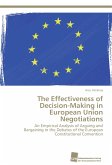Oliver Ziegler raises the question of what role economic interests of the United States play in the regulatory decision making process of the European Union. Critics often assume that U. S. dominance in the world economy, fueled by a powerful business elite, has significantly affected EU regulations at the expense of environmental and consumer protection standards. The author falsifies this proposition. He shows, first, that the EU often adopts regulations against the explicit opposition of the U. S. thereby ignoring the principles of transatlantic regulatory cooperation. Second, he demonstrates that business interests in the EU are usually not homogenous and often come second to environmental and consumer concerns. In addition, the author shows the increasing role of the European Parliament in EU regulatory decison making.
Bitte wählen Sie Ihr Anliegen aus.
Rechnungen
Retourenschein anfordern
Bestellstatus
Storno








